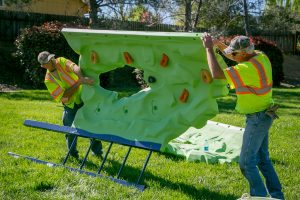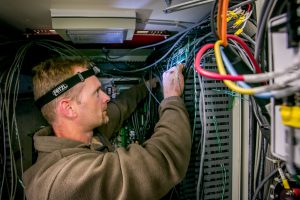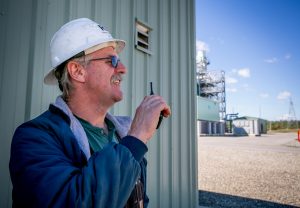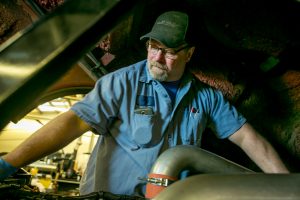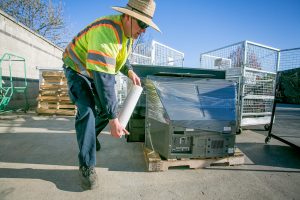Located just about halfway between Seattle and San Diego, the City of Redding is the largest city in Shasta County, and the fourth-largest city in the Sacramento Valley. Once known for its timber mills and wood products, Redding’s economy has diversified dramatically in recent years, as dozens of outdoor and recreation-based startups have chosen to capitalize on Redding’s natural resources and affordable land options.
The population is growing, and that means more work for Redding’s civil servants who make sure every aspect of the city – from its attractive parks to its hazardous waste – and well taken care of. But the city’s electrical and maintenance workers, who are proud members of IBEW 1245, aren’t complaining. They love their city, and they thoroughly enjoy the work they do to enhance the quality of life for Redding’s residents.
State-of-the-Art Structure
Redding’s parks are among its most popular attractions for residents and tourists alike, drawing in nature-lovers of all ages. But all those charming parks require quite a bit of upkeep.
After a fire destroyed a playground at Minder Park, a six-man crew was sent it to install a state-of-the-art plastic-metal play structure to replace the older wooden one that burned down. The crew had just three days to complete the project so that a group of volunteers could come in over the weekend to put the finishing touches on the new playground.
“Yesterday, we filled it in with gravel to bring [the ground] level up to a workable level,” said Redding Park System Lead Worker Mike Herzog. “Today, we’re boring holes for footings. We have almost 20 footings that we have to pour for all the main structure poles that hold everything up.”
Modernizing the System
On the other side of town, IBEW 1245 members were hard at work on a controls upgrade project at Redding’s power plant.
“We were having trouble with the older equipment failing, with no replacement parts [available] for it. So the goal here with this upgrade is more reliability; we’re modernizing the control system to a current system that we can get parts for and work with,” explained Power Plant Maintenance Working Foreman Dale Pack. “The long-term goal is to have the hydro plant out at Whiskeytown Dam tied in too, but that’s a ways down the road.”
The project involved new control systems for peaking plant units, and took more than six months to complete.
“Mostly all the existing wiring for the controls were underground in vaults, most of that wiring was pulled out and abandoned. All new wire is being run to local control rooms, so each unit now has its own local control room, and that ties in with the main peaking plant control room, which is then tied back to the main control room at unit 4,” said Pack. “It’s a pretty lengthy process, pulling new fiber optic and wire in to run all of it.”
From Fire Engines to Lawn Mowers
Over in the fleet maintenance garage, Mechanic Jay Nelson worked to repair a fire engine that was experiencing an electrical issue. Nelson specializes in fire engines, but explained that if it has wheels and an engine, chances are his department will be tasked with fixing it at some point.
“We cover everything from basic maintenance to major repairs on all the vehicles … from fire engines to lawn mowers and everything in between,” said Nelson. “We act as parts men, service writers … We’re welders, we’re fabricators, we’re electricians, the whole gamut. We do it all, from start to end.”
Hazardous Properties
Over in the solid waste department, Household Hazardous Waste Technician Jesse Colia works with the specialists to collect and dispose of the kind of stuff that doesn’t go into the trash bin, from old TVs and electronics to toxic chemicals found around the home.
“We take in paint, we take in oil, we take in a lot of pesticides, pretty much any household cleaners, and whatever other household products that people might have,” Household Hazardous Waste Technician Jesse Colia explained. “At times we might have to identify it to find out the hazard properties of it; that way we know how to safely transport it for disposal.”
“We recycle what we can with the paint; we have a re-use program. We take in the oil, which also gets recycled. The majority of the other chemicals get incinerated,” according to Colia.
Benefits and Brotherhood
The members all work in different fields, but they have one thing in common – their appreciation for the union. Both the Electric and Maintenance units at the City ratified new contracts earlier this year.
“The recent contracts that we’ve gotten have been good. I appreciate what’s been done and all the hard work behind the scenes on that,” said Pack. “I don’t know why anybody wouldn’t be happy with where we landed. In this current day and age, that’s a really big accomplishment.”
“I like how active this union is. I’ve was in another union that didn’t seem to be as active. But with this union, when we voice our concerns, they listen,” said Colia. “And I actually really do appreciate the response that I get. [Business Rep Sheila Lawton] has been fantastic with getting back to us, responding quickly, and handling whatever issues we might encounter.”
“The union creates job security, and I like the benefits and the brotherhood that goes along with it,” said Herzog.
